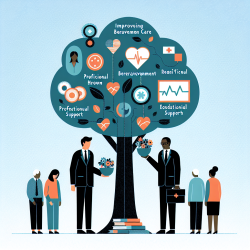Introduction
Burnout is a growing concern among speech-language pathologists (SLPs), especially those working in school settings. The demands of managing Individualized Education Programs (IEPs), the pressure to deliver measurable outcomes, and the emotional investment in each child's progress can take a toll on even the most dedicated professionals. As an SLP, you might find yourself feeling overwhelmed, questioning your career path, and yearning for a change. In this blog, we explore data-driven strategies that can empower you to take the next step towards a more fulfilling and balanced professional life.
Understanding the Burnout Phenomenon
Burnout is characterized by emotional exhaustion, depersonalization, and a reduced sense of personal accomplishment. According to a recent survey conducted by the American Speech-Language-Hearing Association (ASHA), over 60% of SLPs report experiencing burnout symptoms. The implications of burnout are significant, affecting not only your mental health but also the quality of care provided to children.
Data-Driven Strategies for Change
Addressing burnout requires a systematic approach that combines personal introspection with data-driven decision-making. Here are some strategies to consider:
- Self-Assessment: Utilize tools like the Maslach Burnout Inventory to objectively assess your burnout levels. This data can help you identify specific areas that need attention.
- Professional Development: Engage in continuous learning opportunities that focus on stress management, resilience, and work-life balance. Data shows that SLPs who invest in professional development report lower burnout rates.
- Online Therapy Services: Consider transitioning to or incorporating online therapy services, such as those provided by TinyEYE. Studies indicate that online therapy can reduce workload stress by offering flexible scheduling and decreasing travel time.
- Collaborative IEP Management: Use data analytics tools to streamline IEP processes. Efficient management of IEPs can reduce administrative burdens and free up time for more direct interaction with students.
Taking the Next Step
Recognizing the need for change is the first step towards overcoming burnout. Whether it's seeking new professional opportunities, adopting innovative therapy methods, or enhancing your skills, the key is to make informed decisions based on data and personal insights. By taking proactive steps, you can reignite your passion for speech-language pathology and improve your overall well-being.
Conclusion
As an SLP, your role is crucial in shaping the communication skills of children. Ensuring that you are mentally and emotionally healthy is paramount to providing the best care possible. By embracing data-driven strategies, you can combat burnout and continue to make a positive impact in the lives of the children you serve. Remember, change is not just possible; it is necessary for growth and fulfillment.










